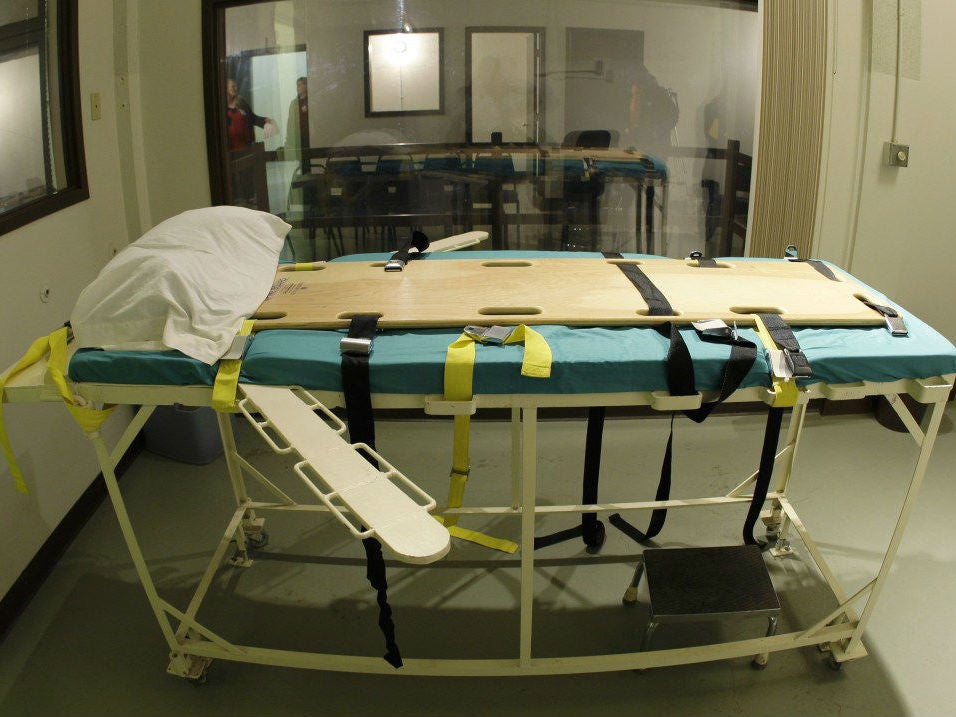Washington state ends capital punishment because it is 'arbitrary and racially biased'
Northwestern state has had moratorium since 2014

Your support helps us to tell the story
From reproductive rights to climate change to Big Tech, The Independent is on the ground when the story is developing. Whether it's investigating the financials of Elon Musk's pro-Trump PAC or producing our latest documentary, 'The A Word', which shines a light on the American women fighting for reproductive rights, we know how important it is to parse out the facts from the messaging.
At such a critical moment in US history, we need reporters on the ground. Your donation allows us to keep sending journalists to speak to both sides of the story.
The Independent is trusted by Americans across the entire political spectrum. And unlike many other quality news outlets, we choose not to lock Americans out of our reporting and analysis with paywalls. We believe quality journalism should be available to everyone, paid for by those who can afford it.
Your support makes all the difference.The state of Washington has abolished capital punishment - the 20th US state to do so - after its highest court ruled it was carried out in a way that was arbitrary and “racially biased”.
The state, the last in the nation with a working gallows, has not carried out an execution since its governor imposed a moratorium in 2014.
On Thursday, while making no comment about the morality or otherwise of the death penalty, which was reintroduced in 1976 after the end of a federal nationwide moratorium, the state supreme court said it had not been applied in a way that could be considered fair.
“The death penalty, as administered in our state, fails to serve any legitimate enological goal. It is invalid because it is imposed in an arbitrary and racially biased manner,” wrote chief justice Mary Fairhurst in the lead opinion.
“The death penalty is unequally applied - sometimes by where the crime took place, or the county of residence, or the available budgetary resources at any given point in time, or the race of the defendant.”
She added: “Our capital punishment law lacks ‘fundamental fairness’.”
Robert Dunham, executive director of the Death Penalty Information Centre, a Washington DC-based organsisation that monitors the death penalty, told The Independent the ruling was significant because it was based on a determination of fact.
“It found that the Washington state cannot carry out the death penalty in a way that is constitutionally acceptable,” he said. “I think that lawyers in a number of other states will be looking very closely at this ruling.”
He said the US was undergoing a major shift in attitudes towards the death penalty, among both liberals and conservatives. The result, he said, was that there were fewer capital sentences and fewer executions.
Of the 20 states to have banned the death penalty, eight made the decision since 2000. Delaware was the previous state to do so, in 2016.
Reuters said there were 23 executions in the United States in 2017, down from a peak of 98 in 1999.
It said the Washington court, based in Olympia, had analysed use of the death penalty in the state over the decades and found that it was imposed in an “arbitrary and capricious manner” with racial bias built into the system.
The state, which has executed five inmates since the US Supreme Court reinstated the death penalty in 1976, placed its own moratorium on executions in 2014. Its eight prisoners on death row are now serving life sentences.
Governor Jay Inslee, a one-time supporter of capital punishment, said in a statement that the ruling was “a hugely important moment in our pursuit for equal and fair application of justice”.
“The court makes it perfectly clear that capital punishment in our state has been imposed in an ‘arbitrary and racially biased manner,’ is ‘unequally applied’ and serves no criminal justice goal,” he said.
The ruling came in the case of Allen Eugene Gregory, a black man who was convicted of raping, robbing and killing Geneine Harshfield, a 43-year-old woman, in 1996.
His lawyers, Neil Fox and Lila Silverstein, said the death penalty is arbitrarily applied and that it is not applied proportionally, as the state constitution required
“However one feels about the propriety of capital punishment in theory, in practice the death penalty is imposed in an unfair, arbitrary, and racially biased manner,” Ms Silverstein said in a written statement. “The Supreme Court properly ruled the Washington constitution does not tolerate such an unfair system.”
Washington state was the last to offer hanging as a means of capital punishment if an inmate chose that method instead of lethal injection. Delaware dismantled its gallows in 2003.
Join our commenting forum
Join thought-provoking conversations, follow other Independent readers and see their replies
Comments